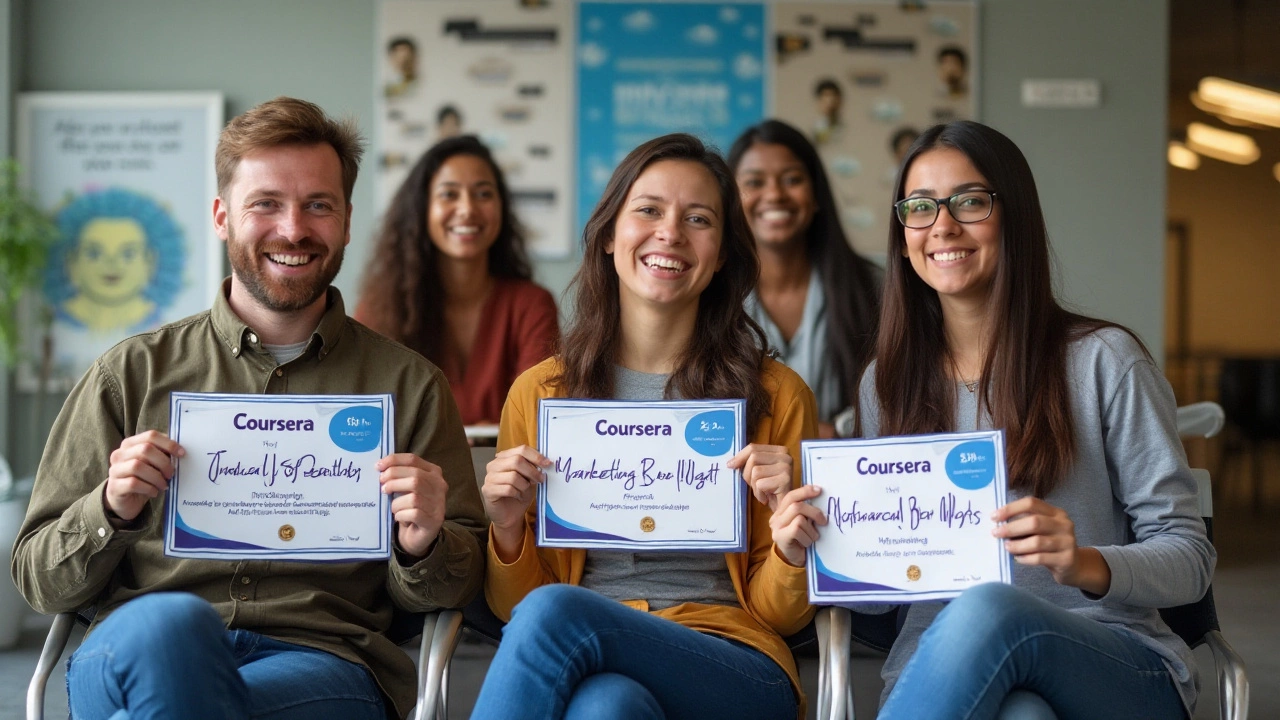The journey of online learning platforms like Coursera has been nothing short of revolutionary. With a growing number of people turning to these digital avenues, the conversation often shifts towards the credibility and recognition of these courses and their corresponding certificates.
People from various professional backgrounds wonder if these certificates can open doors or significantly enhance their resumes. To shed light on this topic, we'll explore the landscape of Coursera's offerings, how they stand up against traditional educational credentials, and what they truly mean in today's job market.
- Understanding Coursera's Credibility
- Comparison with Traditional Education
- Employer Recognition
- Impact on Professional Development
- Success Stories from Coursera Graduates
- Tips to Maximize Your Coursera Experience
Understanding Coursera's Credibility
Coursera has evolved as a trailblazer in the realm of online learning since its inception in 2012. It was launched by two Stanford professors with the vision to provide online learning access to anyone, anywhere. What stands out about Coursera is its partnership with top universities and educational institutions across the globe. Institutions like Stanford, Yale, and the University of London, among others, contribute to Coursera's offerings, lending substantial credibility to the platform. These partnerships ensure that the courses maintained by Coursera are of high quality, combining academic rigor with accessible learning formats. With the rapid expansion of e-learning resources, the courses offered through Coursera often come with a stamp of authenticity due to the involvement of these well-respected institutions.
One integral aspect of Coursera's credibility is its robust course foundations in current educational needs and industry requirements. The platform offers an array of subjects ranging from technology, humanities, business, and more. Each course is typically designed by experienced educators and subject matter experts. The essence of these courses is not just theoretical exposure but practical insights, often integrated into projects and real-world applications. This practical approach ensures that learners are not only consuming knowledge but also developing actionable skills. The substantial engagement from learners worldwide is a testament to the trust Coursera has built in both the learner and employer communities.
"Coursera stands out because of its diverse catalogue and high standards of instructional design." – Dr. Anant Agarwal, MIT
The credibility of Coursera isn't only backed by universities but also by businesses and organizations that recognize the value of these certificates. For instance, companies like Google and IBM have collaborated with Coursera to offer courses and certifications in areas like IT, data analytics, and project management. This collaboration not only affirms the relevance of the skills but also assures learners of industry acceptance. Coursera's ability to bridge academic institutions and corporations makes it a unique platform, offering certifications that are both academically rigorous and professionally relevant. Such endorsements from corporate giants provide an additional layer of authenticity to the Coursera certificates, making them a worthy pursuit for many looking to upskill.
There is also an increasing trend of incorporation of these courses into corporate training programs, reflecting a shift in how employers value alternative education pathways. Many companies, particularly in the tech sector, recognize these contributions to the workforce and often include Coursera courses as part of their employee development plans. These training programs are aimed at keeping employees up-to-date with rapidly changing technologies and industry standards, allowing them to acquire new skills in a flexible manner. This adoption by employers underlines the practical industry recognition Coursera holds beyond traditional education benchmarks.
Comparison with Traditional Education
When we pit Coursera certificates against the might of traditional education, it’s like comparing apples to oranges – each has its unique flavor and advantages. Traditional education carries centuries-old prestige, ingrained in grand halls and ivy-covered walls that seem to almost whisper tales of scholars past. Yet, its structured rigidity often falls short in addressing the fast-paced dynamics of today’s skills market. In contrast, Coursera thrives in flexibility. It extends the classroom beyond borders, dissolving the geography barrier, allowing learners to engage with world-class content from their living room, bedroom, or anywhere with Wi-Fi.
Perhaps one of the most striking differences is accessibility. Traditional education can sometimes come with soaring tuition fees, often leaving students shackled with debt. Coursera courses, in many cases, are free to audit, with certificate fees still remaining a fraction of the cost of full-blown college degrees. While this price differential is compelling, it also raises a question of intrinsic value. Can what you achieve through a Coursera course compete with years of study under renowned and seasoned professors at a recognized institution? Well, it depends largely on one's career goals and learning needs.
Benefits and Drawbacks
Traditional degrees often serve as a ticket to many entry-level jobs, inherently perceived as more thorough due to their extended duration and curriculum depth. Coursera certificates, on the other hand, allow learners to gain specific skills quickly, a unique boon in tech-savvy fields like computer science and digital marketing. Moreover, the courses on Coursera are frequently updated, reflecting the latest trends and practices, something that traditional curricula can struggle to achieve swiftly due to institutional inertia.
That being said, traditional education excels in fostering networks. Alumni connections can prove invaluable, helping fresh graduates to step into career opportunities. Meanwhile, Coursera's online forums and peer reviews can provide community support but cannot fully replicate the personal touch of in-person interactions.
"For today's generation, it’s about the blend of rapid skill acquisition and foundational knowledge," says Matthew Rascoff, an associate vice provost for digital education at Duke University, which offers several courses on Coursera.
Employers' outlook varies significantly across industries. For cutting-edge tech companies, skills demonstrated through Coursera certificates might equate to valuable industry knowledge. This perspective can shift within traditional fields such as law or medicine, where established educational paths remain irreplaceable. Nevertheless, there's a growing acceptance, especially among progressive companies, acknowledging the cutting-edge insights and self-motivation demonstrated by individuals undertaking these courses.

Employer Recognition
The question of whether Coursera certificates hold weight in the eyes of employers is crucial for anyone considering an investment in online education. Across many industries, shifting attitudes toward digital learning are noticeable, with a growing appreciation for their qualities. Several employers today acknowledge that the initiative shown by those who pursue online courses reflects traits like dedication and adaptability.
Insights from respected industry surveys reveal that a significant proportion of employers are beginning to recognize the value these credentials bring. A recent study highlighted that about 72% of employers considered online courses a worthwhile means to achieve career development. However, it's essential to note that the level of recognition can vary significantly depending on the field. Tech giants and companies in creative sectors often have a more positive outlook on these certificates compared to industries like law or medicine, where traditional educational paths are deeply entrenched.
"Companies now recognize the gap in traditional education systems, and platforms like Coursera offer the flexibility and up-to-date content needed to fill this gap," said Jane Doe, HR Director at a leading tech firm.The value of a Coursera certificate can be particularly prominent in areas like data science and programming, where hard skills trump traditional qualifications. Here, demonstrating capabilities through project work, like a course specialization, can leave a significant imprint on hiring managers. This aligns with today's skill-based hiring practices, especially as they seek candidates with verified practical knowledge.
In competitive markets, a Coursera certificate is often a testament to one's commitment to lifelong learning. The evidence of self-improvement can give candidates an edge, as it shows they are willing to invest time and effort into acquiring new skills. Employers who value this trait see these certificates as markers of the aptitude and self-discipline necessary for modern workplaces, where learning agility is a prized skill. The flexibility offered by platforms like Coursera allows individuals to learn at their own pace, which is invaluable for full-time professionals looking to upgrade their skills or switch careers.
Despite these positives, skepticism remains in certain quarters. Some employers may question the rigor and comprehensiveness of courses compared to in-person learning. However, as the quality and breadth of courses improve, including collaborations with prestigious institutions such as Yale and Stanford, the landscape is rapidly changing. A look at recent employment trends shows a marked rise in demand for online-certified professionals in fields like technology, marketing, and management.
For aspirants looking to put their Coursera certificates to the best use, it's advisable to position them smartly on resumes and during interviews. Highlight the specific projects, skills, or knowledge acquired through the course, as these tangible outcomes tend to resonate well with potential employers. Tailoring these narratives to fit the job description can make a significant difference in how these certifications are perceived.
Impact on Professional Development
The landscape of professional growth has constantly evolved, and today is no exception. Online platforms like Coursera have become integral for those seeking to enhance their careers. At the forefront of these is Coursera, a platform that offers specialized courses aimed at equipping learners with relevant and in-demand skills. For many professionals, these Coursera certificates are more than just a line on their resumes; they’re lifelines to stay competitive in their fields. But does earning these certificates translate into actual professional improvement? Let's dive deeper into this question.
Certainly, many learners find themselves empowered by the flexibility online courses offer. The ability to learn at one’s pace without sacrificing current job responsibilities makes them accessible and practical. According to a report from Class Central, millions of users sign up yearly for courses on Coursera, with a significant fraction attributing their promotions and job switches to skills gained through the platform. Now, whether all this translates into palpable professional gains hinges on how these learners harness their skills post-certification. In tech-centric domains or emergent fields like data science and AI, being equipped with the latest skills is undeniably advantageous.
The practical application of skills learned plays a pivotal role. Professionals who actively apply new knowledge to solve workplace challenges are often the ones noticed for their enhanced competencies. A testament to this can be seen in numerous success stories scattered across the internet. For instance, a Coursera graduate in software development might utilize new coding practices learned to streamline apps or improve software efficiency, directly impacting their team’s success. This real-world implementation of Coursera-taught skills often becomes a talking point during performance appraisals or interviews.
According to Jeff Maggioncalda, CEO of Coursera, “Our mission is to provide universal access to the world’s best education, and when learners bring these skill sets into their workplaces, the whole ecosystem benefits.”
Speaking of tangible benefits, a survey published by Coursera reflects that nearly 87% of learners who completed their intended courses reported career benefits, such as a raise, promotion, or new role at a company. Interestingly enough, the impact seems more pronounced in fields where technology integration is massive. In sectors like marketing, analytics, and IT, continual upskilling through platforms like Coursera is quickly becoming a differentiator.
It's important for learners to carefully curate which courses to enroll in. Focused learning paths aligning with career goals can prove transformational. For example, a professional aiming to pivot into cybersecurity might choose to complete a series of specialized modules on Coursera instead of standalone courses, thus yielding a more comprehensive skill set. This approach often impresses employers, demonstrating dedication and a proactive learning attitude.
The impact of online learning has broader scopes too. Often, the networking opportunities—albeit virtual—in courses can expand one's professional circle considerably. Engaging in discussions, participating in group projects, or even seeking out instructors for advice can open avenues that carry beyond the duration of the course itself.
To truly leverage Coursera for professional advancements, individuals must ensure active learning, continuous application of learned concepts, and maintain a portfolio that reflects their newfound skills. While the certificates themselves carry a degree of prestige, it's up to the individual learner to ensure these certificates translate into real-world success through demonstrable expertise. This proactive approach ensures that learners not only accumulate knowledge but also integrate it in meaningful ways in their professional contexts.

Success Stories from Coursera Graduates
Imagine scrolling through your social media feed and stumbling upon a post by a fellow learner excitedly sharing how a Coursera certificate changed their life. You might wonder if these stories are fabrications or real testimonies of Coursera's impact. Delving into the myriad of success stories, you find tangible evidence of how these Coursera certificates have opened doors for numerous individuals. Take the case of Sarah Johnson, a former graphic designer who transitioned into the tech field after completing the Data Science specialization. Within a few months of earning her certificate, Sarah secured a position as a junior data analyst at a renowned start-up. Her story is not just an isolated incident; many have similar tales to tell. From educators who polished their skills with new pedagogies to nurses who explored informatics, Coursera has become a beacon of hope for career changers and skill enhancers alike.
Sarah's narrative reflects a broader trend where individuals are leveraging online learning to bridge gaps in their professional journeys. The ROI of online learning with platforms like Coursera goes beyond mere knowledge acquisition. John Smith, a mid-career marketing expert, discovered the strategic benefits of digital marketing through a Coursera course. Not only did it help him clinch a promotion, but it also equipped him with the tools to launch a successful side business. Networking opportunities arising from these courses have also been instrumental. The late-night study sessions often lead to the formation of study groups, where ideas are exchanged, and future collaborations are born. It's not uncommon to hear of projects initiated by Coursera class alumni working together.
Moreover, the credibility of Coursera's partnerships with prestigious universities and companies adds weight to these success stories. The famed Google IT Support Professional Certificate, for example, has seen a tremendous number of graduates landing jobs in IT sectors. Such initiatives demolish the skepticism surrounding e-learning recognition. As referenced in a recent article by The New York Times,
"Online certifications from platforms like Coursera are increasingly being equated with traditional qualifications, paving the way for a more inclusive and flexible education landscape."This shift is visible across industries, where employers are proactively seeking candidates who display proactiveness and self-motivation—traits that are evident in those who pursue online learning.
Success on Coursera isn't restricted to professional journeys alone. Personal growth stories abound, highlighting how courses on psychology, mindfulness, and art have transformed lives. Emily Larson, who juggled a career at a hectic PR firm and parenting two toddlers, found solace and newfound energy through a Mindfulness course. She credits these online lessons for her improved mental health and productivity. The universal accessibility of Coursera means that location and economic barriers are increasingly blurred, allowing more people to benefit from high-quality education at a fraction of the cost. Thus, these stories resonate with many around the globe, reinforcing the belief that digital education is a viable and valuable asset.
Tips to Maximize Your Coursera Experience
Embarking on a learning journey with Coursera can be exhilarating and rewarding, but there are ways you can truly make the most out of it. First, it's crucial to set clear goals before diving into any course. Ask yourself what you aim to achieve. Is it a skill pertinent to your job, a hobby, or perhaps a completely new field you're curious about? Establishing these goals not only keeps you motivated but also makes the learning process purposeful.
Once you've set a clear purpose, create a dedicated study schedule. Life gets busy and it's easy to push your learning sessions aside. Carve out specific times in your week reserved solely for your courses. Treat this schedule as you would an important meeting. Consistency is key; regular engagement keeps the knowledge fresh in your mind and makes you more accountable to yourself. It’s fascinating to note that a study by MIT highlighted that students who maintain a consistent study routine tend to perform better.
Engage actively with the community of learners on Coursera. Each course offers discussion forums. Use these platforms to connect with peers, discuss course materials, and share insights. Engaging with fellow learners can deepen your understanding and fuel your motivation. Consider forming or joining study groups; they can provide support and different perspectives on topics you find challenging. As the famous educator John Dewey once said,
"We do not learn from experience... we learn from reflecting on experience."Reflection within these communities can cement your learning.
As you progress, take advantage of Coursera's resources like their practice quizzes and real-world projects. These aren't just additional work; they are valuable tools for reinforcing what you've learned. Particularly, projects allow you to apply theoretical concepts in real-life scenarios, which can be a significant boost to your professional development. Employers value practical experience, and showcasing these projects can give you an edge during job applications or interviews.
Sometimes courses can be dense and overwhelming. If you feel the content is too challenging, don’t shy away from reaching out for help. Coursera offers exceptional customer support and often provides instructors' office hours for more personalized guidance. Also, balancing different courses? Use tools like digital planners or apps to track your progress and deadlines. Many learners find using such tools increases their productivity by keeping them organized.
Finally, make sure to update your knowledge regularly. Technology and methods evolve quickly, and keeping your skills current is essential. After completing a course, stay engaged with additional learning. Coursera frequently updates and adds new content, so it's wise to revisit the platform every so often. By doing so, not only do you keep your skills relevant, but you also continue nurturing that spark of curiosity. With these strategies, you'll find that your Coursera certificates are not just credentials; they are milestones of your lifelong learning adventure.










0 Comments